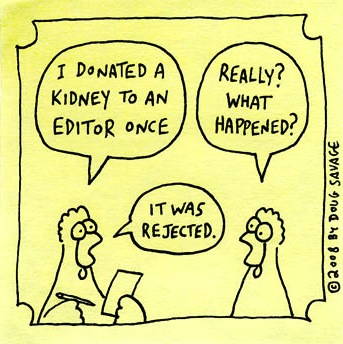Whatevs: on writing rejection
A ‘failed’ novelist went viral recently when she wrote about giving up writing after her two literary fiction manuscripts were rejected one after the other. The comments make for interesting reading and broadly fall into two camps. The first is advice to self-publish, which I disagree with. (Hold the hate mail and let me explain.) While certain genres can potentially do well (emphasis on potentially), self-published literary fiction sells poorly. So unless you’re happy being read only by family and friends, it’s not a great option. The second is empathy, based on recognition of the current publishing climate (more on that in a moment), and encouragement to continue regardless of her lack of success to date.

The fact is, behind any successful novelist you’ll find a bunch of rejected works. Before Eliza Henry-Jones published her debut novel, In the Quiet, she wrote ten manuscripts which were all rejected. But she persevered, and now her second book, Ache, is due out next month. ‘It took me ten years to get a publishing deal; ten manuscripts; rejections from nearly every publisher in Australia,’ Henry-Jones says. ‘Rejection can feel like a physical wound, it can stall you and hurt you and stop you in your tracks—but if you are able to frame it properly, it has the capacity to both steady you and focus you.’
So how to survive knock back after knock back? Common advice is to remember that it’s the work being rejected, not the individual, but that’s a fairly arbitrary distinction. Novels take years to complete, and require absolute investment, so rejection is never going to be easy to navigate. What’s more studies have shown that rejection activates the same areas of the brain as physical pain. As Isaac Asimov said, ‘Rejections slips, or form letters, however tactfully phrased, are lacerations of the soul, if not quite inventions of the devil.’ Yet every published author has been lacerated and pushed on. Henry-Jones says, ‘Rejection reminded me over and over that I loved writing. That there were reasons bigger than a career or money or recognition to keep hunching over my keyboard to write stories, one after the other.’
Read More »Whatevs: on writing rejection

The truth is, writing a book is hard. The process is messy and complicated and reaching the finish line is an achievement in itself. Sometimes a book is rejected because the work isn’t ready yet and needs further refining. Then it’s possible to reframe rejection as an opportunity. But sometimes it’s rejected because the work just hasn’t found the right publisher, or the industry has decided that this particular kind of book won’t sell enough copies, or any number of other seemingly random reasons. Dr Seuss was told that his work was ‘too different from other juveniles on the market to warrant its selling’. Stephen King’s Carrie was rejected by 30 publishers, with one telling him, ‘We are not interested in science fiction which deals with negative utopias. They do not sell.’ (It sold in the millions.) And Sylvia Plath received the following rejection: ‘There certainly isn’t enough genuine talent for us to take notice.’
Indeed history is littered with the rejection slips of now celebrated books. In other words, publishers get it wrong. All the time. There is nothing about publishing that even vaguely approaches an exact science. Despite the fact that sales and marketing now hold great sway in determining whether or not a book will make it past acquisitions, predicting what will and won’t sell is all just an educated guessing game.
Rebecca James recalls how her bestselling debut, Beautiful Malice, was ‘rejected so many times I lost count. It was rejected by literary agents and publishers. It was rejected because the characters were too young, because they were too old, because they were neither one nor the other.’ Eventually it netted a $1 million book deal and sold in 52 countries. ‘Amazing and wonderful things do happen,’ she concludes.
 In short, rejection is part of the business of writing. Writers have to be simultaneously thin-skinned (to write) and thick-skinned (to publish). In a Writers on Writing podcast, author Lisa Cron (who has also worked in publishing) quotes the statistic that 96% of novels are rejected. She goes on to say: ‘[But] I was talking to my agent about it and we were going, that’s way too low a number, it’s actually more like 98% or 99% of novels are rejected.’
In short, rejection is part of the business of writing. Writers have to be simultaneously thin-skinned (to write) and thick-skinned (to publish). In a Writers on Writing podcast, author Lisa Cron (who has also worked in publishing) quotes the statistic that 96% of novels are rejected. She goes on to say: ‘[But] I was talking to my agent about it and we were going, that’s way too low a number, it’s actually more like 98% or 99% of novels are rejected.’
Depressing, right? All writers can do is continue to forge ahead in spite of it all. To write about the things that won’t let them go, and make the words the very best they can before sending them out. Saul Bellow says, rejections ‘teach a writer to rely on his own judgment and to say in his heart of hearts, To hell with you’. Or as the kids say these days, whatevs.
I hope that ‘failed’ novelist can get to the whatevs stage. It might just be her third book that makes it.
This post first appear on Noted Festival’s blog, NotedBook, here.